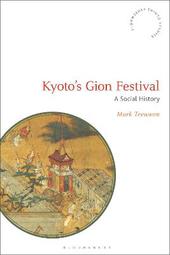
|
Kyoto's Gion Festival: A Social History
Hardback
Main Details
| Title |
Kyoto's Gion Festival: A Social History
|
| Authors and Contributors |
By (author) Mark Teeuwen
|
| Series | Bloomsbury Shinto Studies |
|---|
| Physical Properties |
| Format:Hardback | | Pages:288 | | Dimensions(mm): Height 234,Width 156 |
|
| Category/Genre | Asian and Middle Eastern history
Shintoism |
|---|
| ISBN/Barcode |
9781350229921
|
| Classifications | Dewey:394.269521864 |
|---|
| Audience | | Professional & Vocational | |
|---|
| Illustrations |
15 bw illus
|
|
Publishing Details |
| Publisher |
Bloomsbury Publishing PLC
|
| Imprint |
Bloomsbury Academic
|
| Publication Date |
9 February 2023 |
| Publication Country |
United Kingdom
|
Description
This book focuses on the long history of what is arguably the most prestigious and influential festival in Japan - Kyoto's Gion festival. It explores this history from the festival's origins in the late 10th century to its post-war revival, drawing on Japanese historical studies and archival materials as well as the author's participant observation fieldwork. Exploring the social and political networks that have kept this festival alive for over a millennium, this book reveals how it has endured multiple reinventions. In particular, it identifies how at each historical juncture, different groups have found new purposes for the festival and adapted this costly enterprise to suit their own ends. The history of this festival not only sheds light on the development of Japanese festival culture as a whole, but also offers a window on Kyoto's history and provides a testing ground for recent festival theory.
Author Biography
Mark Teeuwen is Professor of Japanese Studies at Oslo University, Norway. He has published broadly on the history of Japanese religion, and is the co-author of A History of the Ise Shrines: Divine Capital (Bloomsbury, 2017).
ReviewsAn outstanding history of one of the most important festivals in Japan. Situating the Gion Festival firmly within the social and political history of the ancient capital of Kyoto, Mark Teeuwen paints a dramatic picture of how the structure, sponsorship and meanings of the Gion matsuri have changed over the centuries. This vibrant history should be of interest to scholars of festivals, cities, historical change and contemporary rituals. * Sarah Thal, Professor of History, University of Wisconsin-Madison, USA *
|